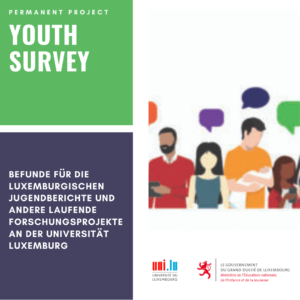Charlotte Haußmann is a sociologist and has been working as a doctoral candidate on the topic of loneliness among young people at the Center for Childhood and Youth Research based on data from the Youth Survey Luxembourg since October 2023.
Jump to content
Charlotte, why are you researching the topic of loneliness among young people?
I do research on loneliness in adolescents and young adults. My focus is on young people between the ages of 12 and 29. This is particularly interesting because this age group has the highest levels of loneliness alongside older people.
We now know from various surveys from other countries such as Germany and the UK that it is mainly old people and very young people who have problems with very high levels of loneliness. These people most often say of themselves: “I often feel lonely.”
I would like to investigate loneliness in the context of young people’s media use: How do young people behave on the Internet, how do they use it and what influence do “social” media, for example, have on loneliness?
Does that mean there is still a research gap?
In loneliness research, especially from a psychological and sociological perspective, the focus is usually on older people. The reason for this is that the transition to retirement in particular is a critical experience, where people lose their entire structure in everyday life and many people live alone again, especially due to urbanization, or because their partner dies.
Young people also have to deal with transitions at some point in their lives. The interesting thing is that loneliness is not so readily attributed to young people. After all, for many, being young means being somehow fresh and agile, looking out into the world with an open mind and wanting to try out lots of things.
Find out more about transitions: Youth Report 2015
However, the fact that such an attitude also comes at a high cost often goes unnoticed by academics and the public. For young people, transitions such as moving house can cost them existing friendships and familiar networks that are lost in the process. Those who move to another city for their first job or to study may initially find it difficult to make connections there. This is somewhat taboo because it contradicts the preconception that young people are always up for change, adventure and variety.
When do we actually speak of “loneliness”? How is it defined?
It would be important to point out that loneliness is a feeling. I can have lots of friends and be socially well embedded: I may have a partner, I may have a child, I may have a job, a degree, and I can still feel lonely. Conversely, I can be surrounded by fewer people and still not feel lonely.
However, research also shows that the number of social contacts correlates with the feeling of loneliness: People who have fewer social contacts are also more likely to feel lonely. Ultimately, however, it’s about preferences, i.e. “What do I want as a person?”.
There are people who simply like less social contact and don’t feel lonely because of it. That’s perfectly fine, but people who feel lonely despite social contact experience a mismatch between their needs and what their everyday life offers them. Feelings of loneliness then actually indicate unfulfilled needs. This is also referred to as social isolation.
Young people from all over the world come to Luxembourg to start their careers. To what extent does loneliness play a role for them?
There are very few studies on migration background. It will also be part of my PhD dissertation to look further into the influence of migration experience.
I actually stumbled across the topic of “loneliness” by chance when I was reading posts on Reddit from people who had recently arrived in Luxembourg or had been here for a while. Many of them wrote: “I can’t find a connection in society here. I don’t know how I can integrate better, how I can make friends”. I found that interesting and it is also part of my project to research the extent to which migration experiences have an influence on feelings of loneliness among young people.
Most people say that you have to rely a lot on clubs and associations here in Luxembourg society, i.e. you really have to follow the structured, institutionalized offers in order to make new acquaintances and friends. Very few recommend more open settings such as meeting people in a café or pub.
Is there a connection between young people’s loneliness and their media use?
There are only a few studies on this. What we do know so far is that motives are decisive. Why do I use social media or the internet? Do I perhaps use it to exchange ideas, to look for information, to actively maintain friendships? This may be interesting for people with a migration history who say I mainly use social media applications to keep in touch with friends or relatives in my home country.
Good to know: The Youth Report 2025 takes a closer look at the digitality of young people.
However, there is also evidence that online contacts do not replace real encounters with other people. In other words, they are less effective at alleviating feelings of loneliness. This also involves physical loneliness. This term means that young people are simply looking for physical contact and that they don’t get this through “social” media, for example.
Studies also show that those who use social media to actively interact with others can effectively reduce feelings of loneliness. However, if people mainly use the internet to compare themselves, to distract themselves or to cope with a personal or social crisis through doom scrolling, then there is an increased likelihood that their own negative thoughts will be exacerbated by the algorithm on the platforms, thus promoting feelings of loneliness.
How does your research relate to the topic of problematic social media use, which has also been researched here at the institute?
As a sociologist, I am more interested in the overall social construct and less in the psychological sequence. Of course there is a large psychological component in my dissertation, but what I want to explore sociologically is how and whether feelings of loneliness (or isolation) lead to a certain negative evaluation of society and ultimately to hostility towards democracy. There is evidence that trust in institutions decreases because people feel so isolated and disconnected from society. And that is very interesting for me as someone who cares about strengthening democracy.
Good to know: Problematic Social Media Use (PSMU) was already researched as part of the 2018 HBSC study.
We can also talk about political participation in this respect, i.e. when people feel increasingly lonely and therefore withdraw from the political processes of our society: How do I reach out to these young people to actively participate in society again? What is needed for social cohesion in society? Unfortunately, loneliness is still an issue that is not discussed enough by sociologists.
How do you keep your dissertation project within the bounds of what is feasible?
Unfortunately, I cannot include commuters in my research because these young adults are generally unable to take part in the Youth Survey Luxembourg. We only reach people who live and are registered in Luxembourg. Those who commute to Luxembourg for work from countries close to the border are unfortunately not represented by our survey.
Find out more about the methodology of the Youth Survey Luxembourg.
I am also unable to trace certain causal relationships because the data from the Youth Survey Luxembourg represents a cross-section. This means that I only have observations at one point in time. I won’t be able to say that more media use leads to loneliness or vice versa. I can say that there are correlations, but probably not in which direction, i.e. which is the hen and which is the egg, which is there first? You won’t be able to find that out.
Why should we in Luxembourg know more about loneliness among young people?
I believe that feelings of loneliness are an underestimated issue. This is because it correlates strongly with mental health and other psychological problems that can also arise in the long term. We know from many studies, especially in psychology, that loneliness leads to psychological problems: poorer sleep, poorer nutrition, obesity, less exercise.
Read more recent findings of the HBSC study on mental health.
People develop a negative attitude if they are lonely for too long: They can no longer approach people openly, even if they had the opportunity to do so, because they judge everything negatively from the outset. We know from many studies that loneliness makes you isolate yourself even more, it’s like a spiral that makes you sink deeper and deeper.
Especially with the trend towards more diverse lifestyles, there is a risk of losing even more people from already vulnerable groups. It would make sense to create targeted meeting spaces and offer young people in particular the opportunity to exchange ideas and get to know each other without social constraints or without worrying (“Am I catching on right now?”). And, perhaps of particular interest to Luxembourg, to create an exchange between cultures.
What measures are there to combat feelings of loneliness?
I know that there is a great deal on offer for young people in Luxembourg, for example youth centers or certain meeting places for young people, and sports clubs also play a large part in this. There are other European countries that have now adopted very specific political measures that aim to create structures. And I can imagine that this will also be implemented in Luxembourg in the future.
Read more of our research on youth centers.
Germany has focused on loneliness this year in the Federal Ministry for Family Affairs, Senior Citizens, Women and Youth, while the UK, Japan and Australia have their own loneliness ministers who are working to reduce feelings of loneliness in the population. This is mainly through small networks in rural areas where people can meet up.
And there is a new trend, especially among young people, which is quite interesting: walks are being organized via social media where people who are new to a city or have been there for a while can meet up and simply walk and talk together. Some people follow these hashtags, for example: #talkandwalk #girlstalkingwalking #girlstalkingandwalking.
The interview was conducted by Moritz Höpner on behalf of the Centre for Childhood and Youth Research.







